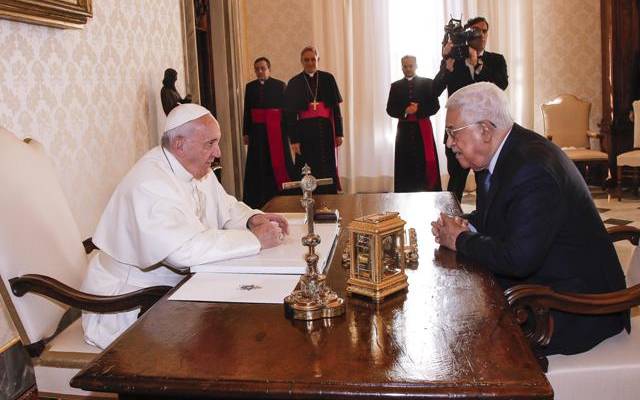While the Vatican stressed the holiness of Jerusalem to “believers of all three Abrahamic religions,” Abbas referred to it as “the capital of Palestine.”
Palestinian Authority (PA) head Mahmoud Abbas met on Saturday with Pope Francis at the Vatican, where he inaugurated the Palestinian embassy to the Holy See.
It was their third meeting. The Vatican stressed the sanctity of Jerusalem to Jews, Christians and Muslims.
Abbas said during the 23-minute meeting that he had only heard through news reports of the proposal by President-elect Donald Trump to move the US embassy to Jerusalem.
The Palestinians strongly oppose the embassy move, claiming it would kill any hopes for negotiating an Israeli-Palestinian peace agreement and rile the region by undercutting Muslim claims to the holy city.
“We hope that this news is not true, because it is not encouraging and will disrupt and hinder the peace process,” he said.
In its communiqué after the meeting with Abbas, the Holy See did not refer to Jerusalem by name, but said that during the talks, “emphasis was placed on the importance of safeguarding the sanctity of the holy places for believers of all three of the Abrahamic religions.”
Abbas referred to Jerusalem as “the capital of the State of Palestine,” adding that he and Francis “reaffirmed the importance of the city for the three monotheistic religions and our support for Jerusalem being an open city.”
Freedom of Worship Under Israeli Sovereignty
In fact, under Jordanian control of the Old City from 1948 to 1967, Israeli-Arab Muslims were denied access to the Islamic sites of Al-Aqsa Mosque and the Dome of the Rock. Similarly, while Christians were granted access to their holy sites, the number of pilgrims authorized to enter the Old City and Bethlehem during Christmas and Easter was restricted.
Moreover, property restrictions forbidding Christians from purchasing land in Jerusalem were imposed on the Christian residents, while institutions of faith were compelled to abide by strict state controls. Religious Christian schools were required to teach Arabic and forced to be closed during Islamic holy days.
Jews were banned completely from the Jordanian-controlled sites, most notably from the Kotel (Western Wall) and other Jewish holy sites, such as the Jewish cemetery on the Mount of Olives. Several synagogues were desecrated and razed to the ground.
Since 1967, when the IDF liberated the Old City of Jerusalem, members of all faiths have enjoyed access to their places of worship.
During the meeting, Abbas – who continues to deny the Jewish connection to Jerusalem – presented Francis with gifts recalling Christianity’s birthplace in the Holy Land, including a stone from the Church of the Holy Sepulcher in Jerusalem and documentation about the ongoing restoration of the Church of the Nativity in Bethlehem.
According to the Vatican’s communiqué, the meeting then “turned to the peace process in the Middle East, and hope was expressed that direct negotiations between the parties will be resumed to bring an end to the violence that causes unacceptable suffering to civilian populations and to find a just and lasting solution.”
After the meeting, Abbas formally inaugurated the new Palestinian embassy across the street from one of the main gates of Vatican City. He pulled back a curtain revealing a plaque and extended the Palestinian flag from a flagpole outside a window. The small embassy, located in the same building as the embassies of Peru, Ecuador and Burkina Faso, comes after recent accords in which the Vatican formally recognized the “State of Palestine.”
“This embassy is a place of pride for us and we hope all of the countries of the world will recognize the state of Palestine, because this recognition will bring us closer to the peace process,” he said.
Jerusalem and its Centrality to Judaism
Jerusalem is the holiest city in Judaism, where the two Holy Temples stood. The Holy City has been the spiritual center of the Jewish people since the 10th century BCE.
By contrast, Jerusalem is the third-holiest in Islam – after Mecca and Medina – and only since about a century after the death of the prophet Mohammed, who had never visited Jerusalem.
Palestinians deny the strong Jewish connection to Jerusalem, despite overwhelming archaeological and historical evidence.
By: AP and United with Israel Staff
Do You Love Israel? Make a Donation - Show Your Support!
Donate to vital charities that help protect Israeli citizens and inspire millions around the world to support Israel too!
Now more than ever, Israel needs your help to fight and win the war -- including on the battlefield of public opinion.
Antisemitism, anti-Israel bias and boycotts are out of control. Israel's enemies are inciting terror and violence against innocent Israelis and Jews around the world. Help us fight back!




